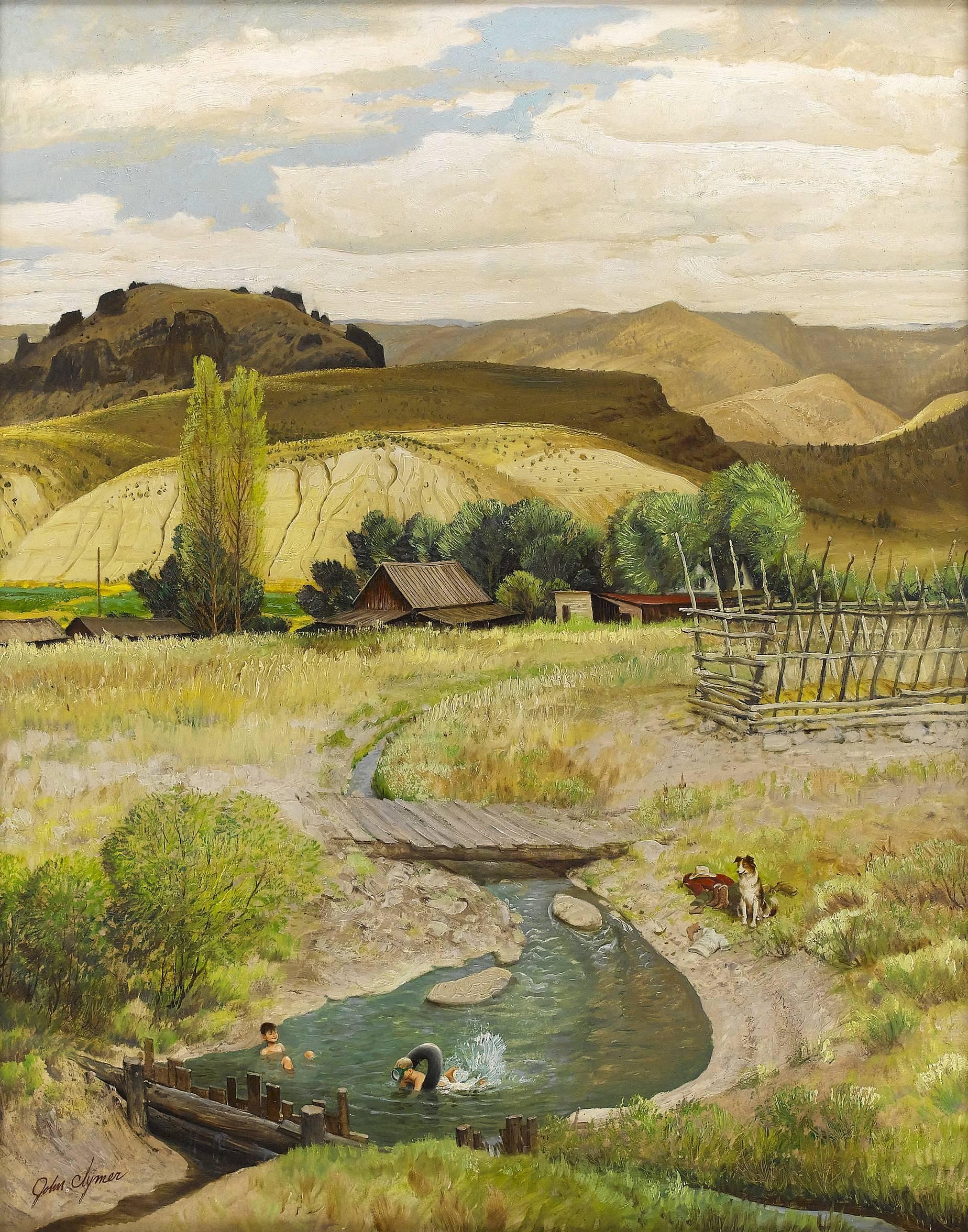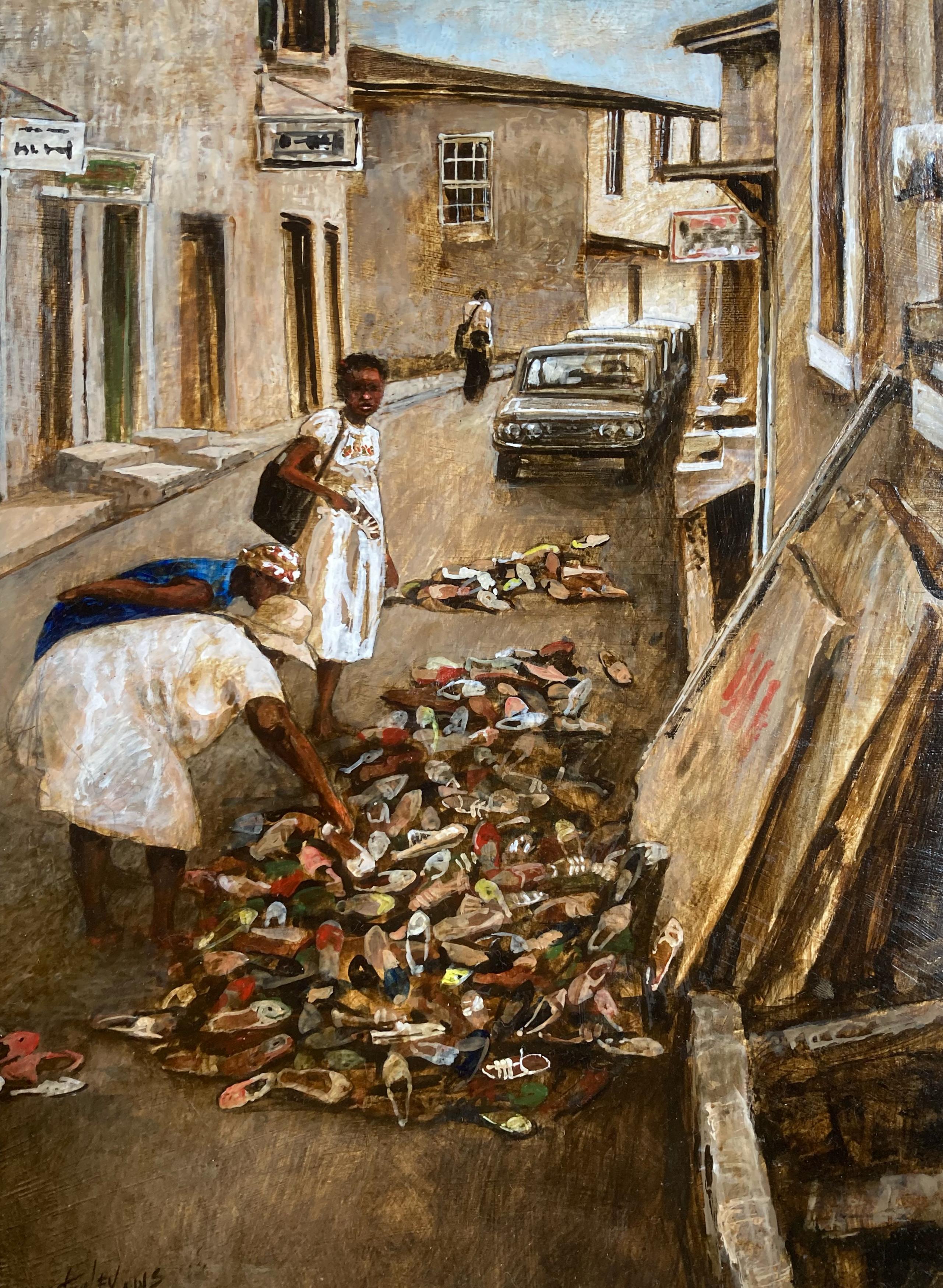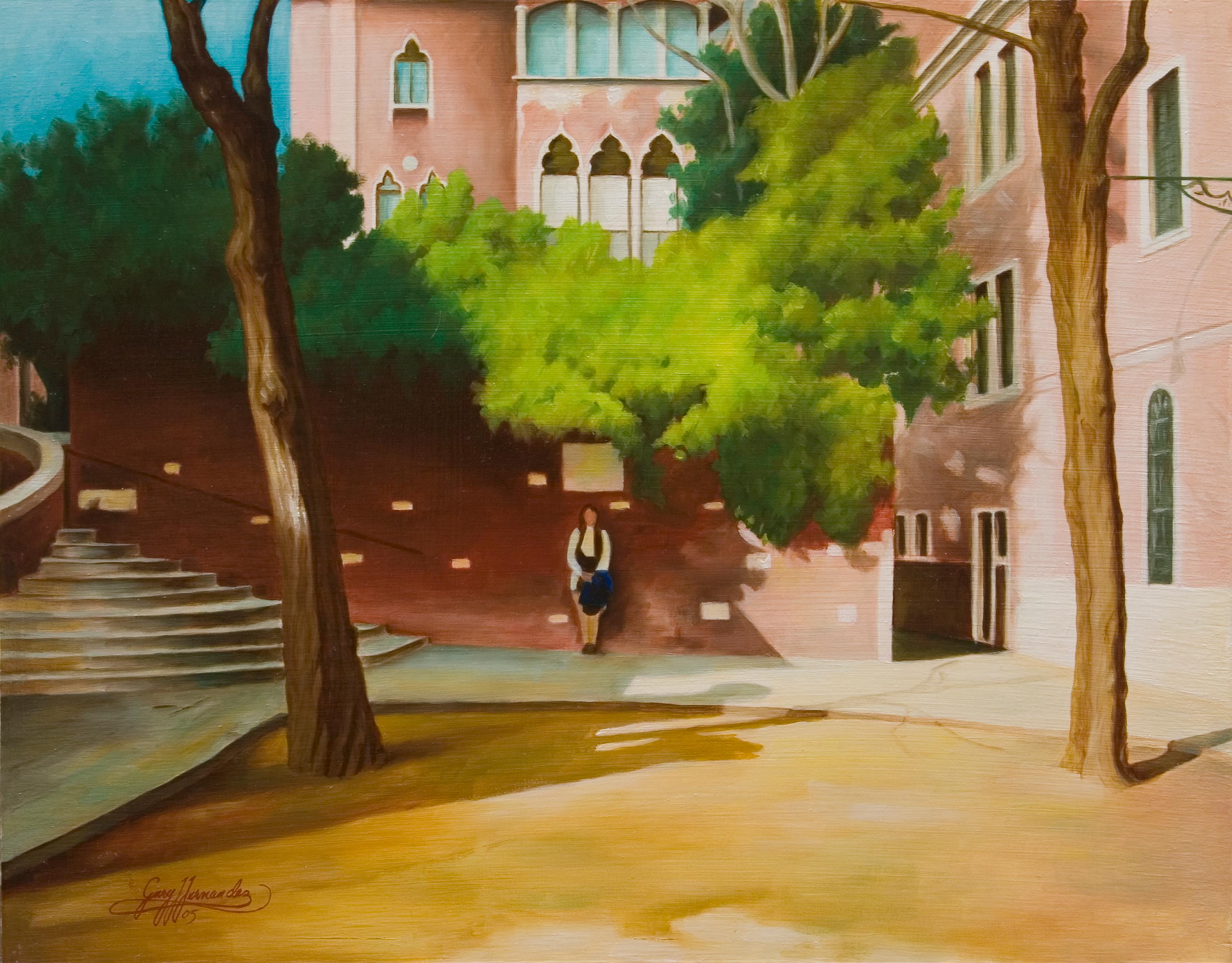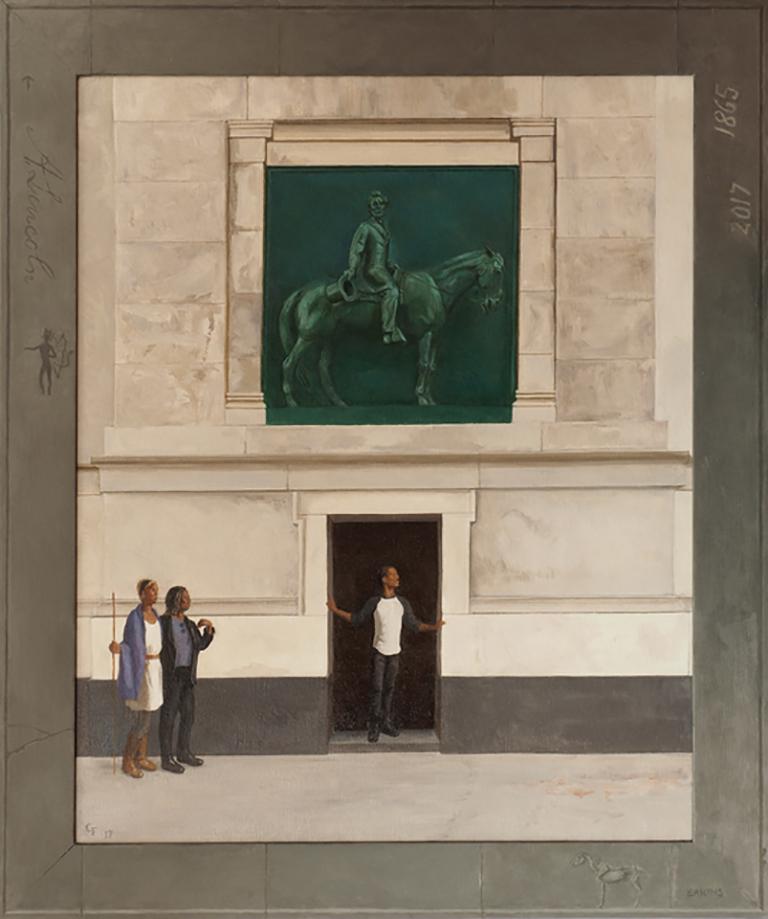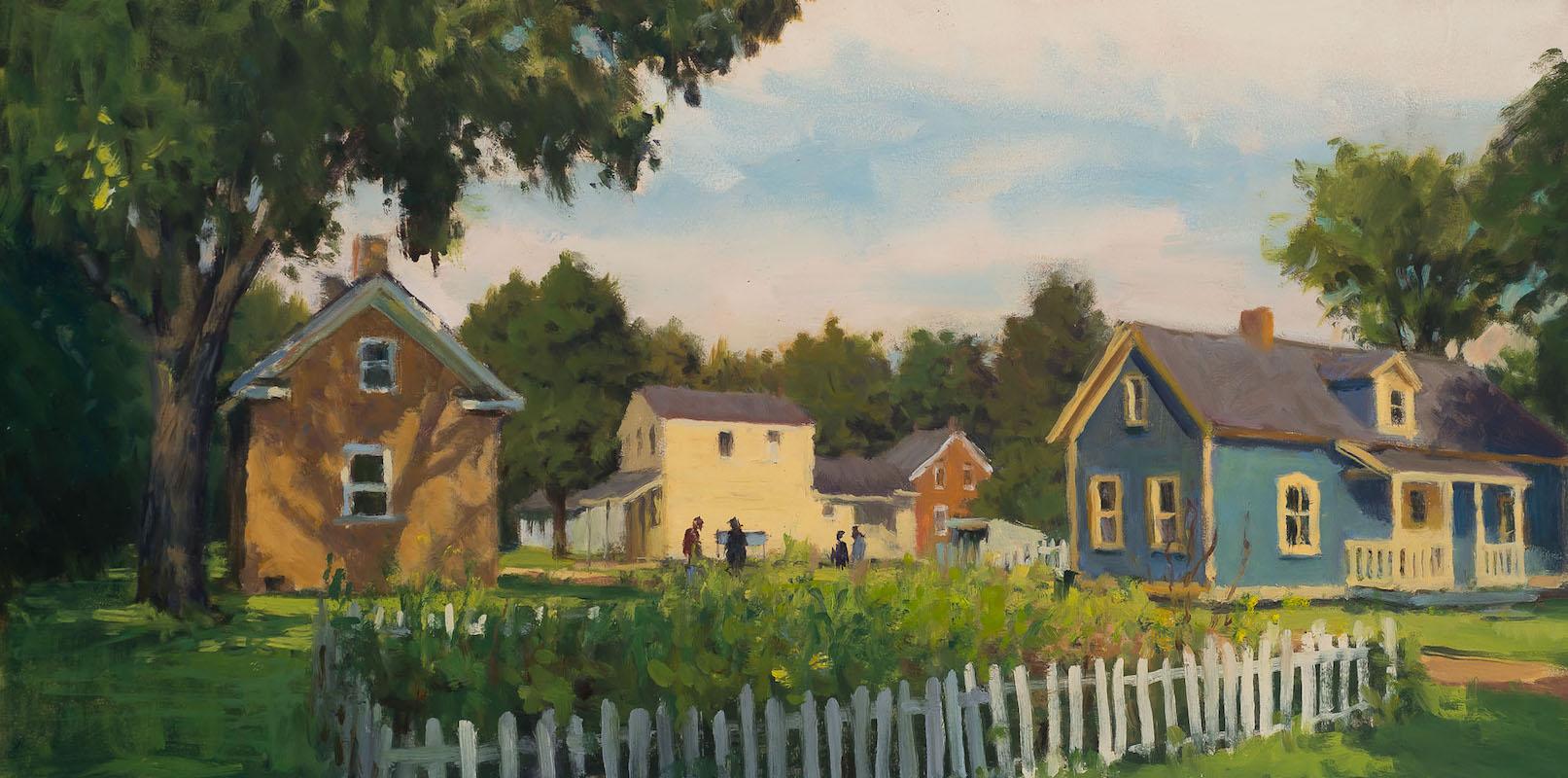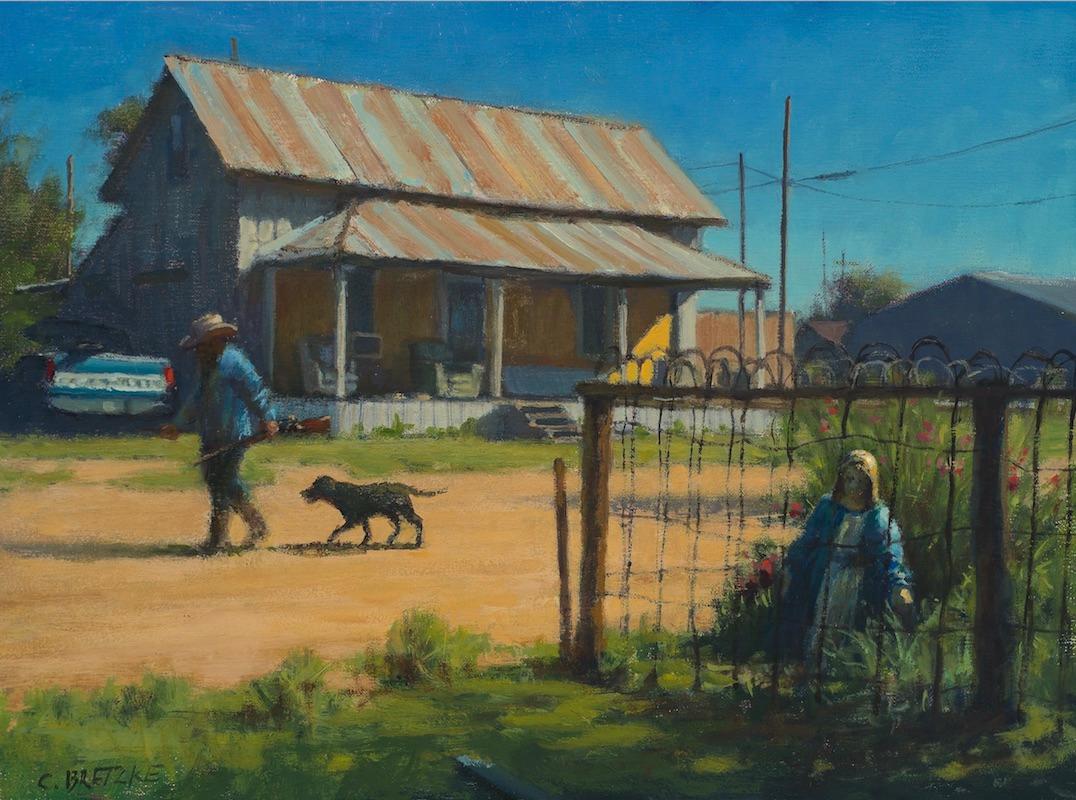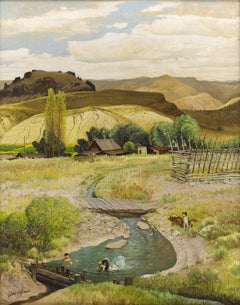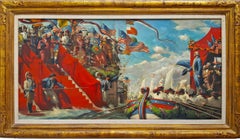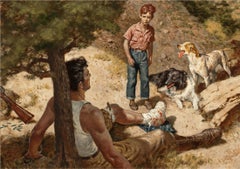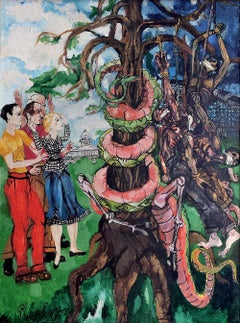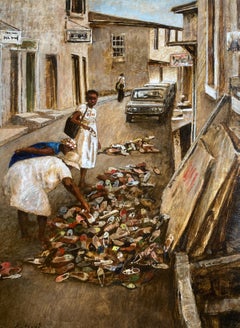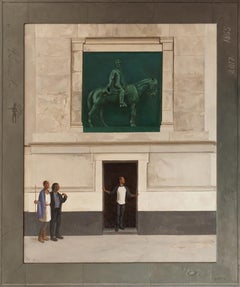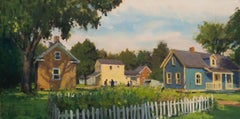Items Similar to Civil Rights, Racial Justice Little Rock
Want more images or videos?
Request additional images or videos from the seller
1 of 16
Philip EvergoodCivil Rights, Racial Justice Little Rock1955
1955
About the Item
"Civil Rights." Evergood's early commentary on racial issues in the 1950s depicts four black men gagged, roped and hanging from a tree. In the background, imprisoned blacks look on through a barbed-wire fence. Whites watch in horror but do nothing to help. Meanwhile, a two-legged and three-headed serpent who symbolizes evil - wraps himself around the tree that physically and symbolically separates the races. This is an important work in the history of American art. It may be one of the very earliest examples of a major American painter doing a major work that challenges racial segregation and injustice at a time when no one else would. The title of the work is inspired by a Historic Supreme Court decision on racial segregation. The Little Rock Nine was a group of nine African American students enrolled in Little Rock Central High School in 1957. Their enrollment was followed by the Little Rock Crisis, in which the students were initially prevented from entering the racially segregated school by Orval Faubus, the Governor of Arkansas. They then attended after the intervention of President Dwight D. Eisenhower. The U.S. Supreme Court issued its historic Brown v. Board of Education of Topeka, Kansas, on May 17, 1954. Tied to the 14th Amendment, the decision declared all laws establishing segregated schools to be unconstitutional, and it called for the desegregation of all schools throughout the nation. After the decision, NAACP attempted to register black students in previously all-white schools in cities throughout the South. In Little Rock, the capital city of Arkansas, the Little Rock School Board agreed to comply with the high court's ruling. Virgil Blossom, the Superintendent of Schools, submitted a plan of gradual integration to the school board on May 24, 1955, which the board unanimously approved. The plan would be implemented during the fall of the 1957 school year, which would begin in September 1957. There are two themes that define this work. The Artist. In 1954, few white people could see American racial issues and have the courage to make a bold public stance about it. This painting is an act of bravery. It’s about Vision. It’s about Guts. The Art. Evergood was a Jewish American, fresh with the horrors of WWII in his mind. Nazi Germany exterminated Jews. Evergood felt America was exterminating Blacks. The world looked on with horror the1940’s but did not do anything. In this work, whites look on with horror do nothing. The White House and a concentration camp-like building are seen together. It’s not one black man being killed, i’s a group of blacks that are systematically killed in the same way. Imprisoned blacks, witnessing the execution as they grasp the prison bars. Are they next in line for the death gallows? Evergood is saying that this is America’s Holocaust. ACA Gallery, New York. Gallery of Modern Art, Columbus Circle New York Owen Gallery, New York
ACA Gallery, New York.
Gallery of Modern Art, Columbus Circle New York
Owen Gallery, New York
- Creator:Philip Evergood (1901-1973, American)
- Creation Year:1955
- Dimensions:Height: 30.5 in (77.47 cm)Width: 22 in (55.88 cm)
- Medium:
- Movement & Style:
- Period:
- Condition:scattered unobtrusive craquelure - colors are bright and saturated for the age of the work.
- Gallery Location:Miami, FL
- Reference Number:1stDibs: LU38538798732
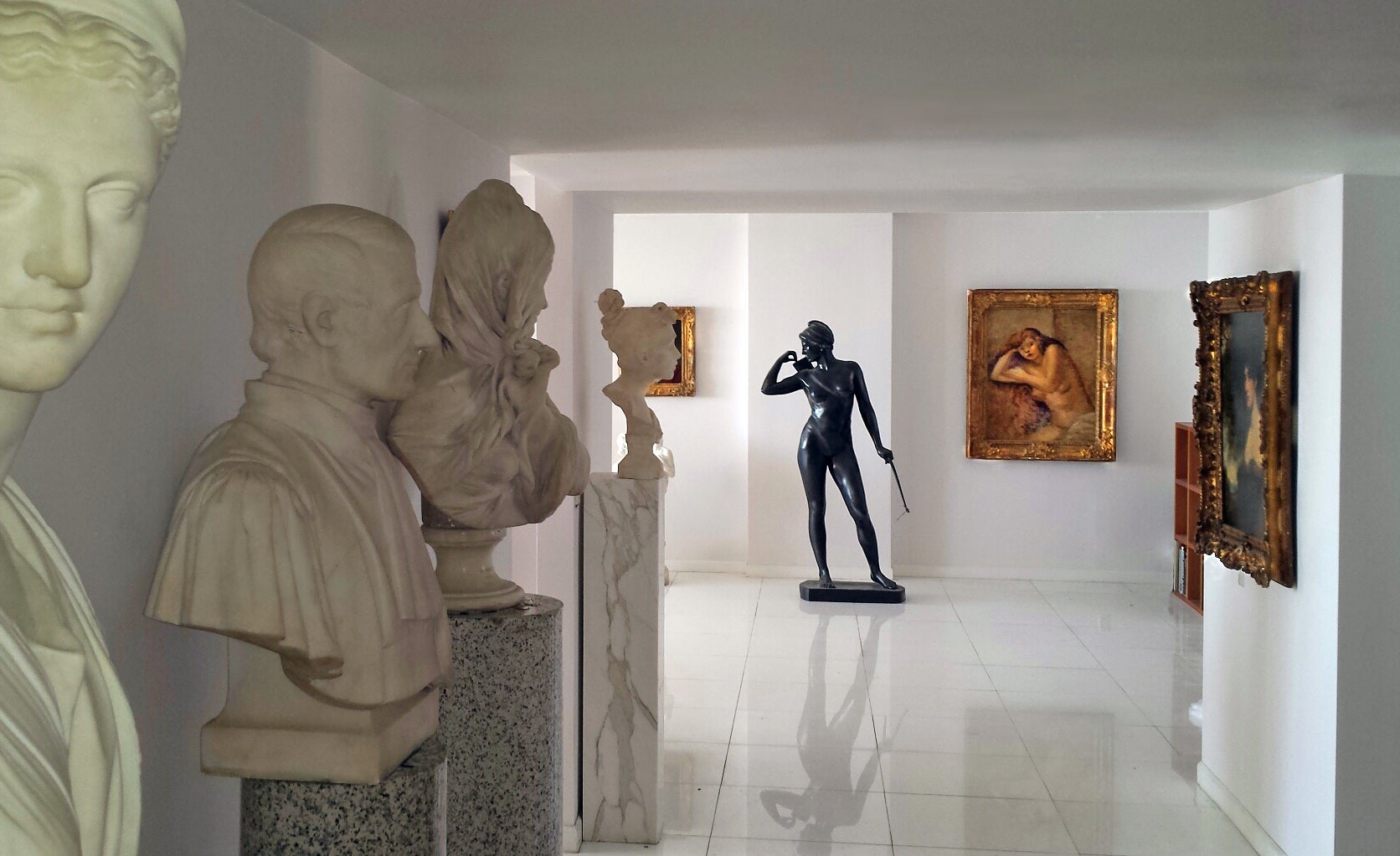
About the Seller
4.9
Vetted Professional Seller
Every seller passes strict standards for authenticity and reliability
Established in 2005
1stDibs seller since 2016
112 sales on 1stDibs
Typical response time: <1 hour
- ShippingRetrieving quote...Shipping from: Miami, FL
- Return Policy
Authenticity Guarantee
In the unlikely event there’s an issue with an item’s authenticity, contact us within 1 year for a full refund. DetailsMoney-Back Guarantee
If your item is not as described, is damaged in transit, or does not arrive, contact us within 7 days for a full refund. Details24-Hour Cancellation
You have a 24-hour grace period in which to reconsider your purchase, with no questions asked.Vetted Professional Sellers
Our world-class sellers must adhere to strict standards for service and quality, maintaining the integrity of our listings.Price-Match Guarantee
If you find that a seller listed the same item for a lower price elsewhere, we’ll match it.Trusted Global Delivery
Our best-in-class carrier network provides specialized shipping options worldwide, including custom delivery.More From This Seller
View AllSaturday Evening Post cover, August 29, 1959. - Americana
By John Ford Clymer
Located in Miami, FL
This classic Post cover combines the vastness of the American West landscape with the intimacy of iconic Americana: two kids swimming in a rura...
Category
1950s American Realist Landscape Paintings
Materials
Oil, Board
George Washington Marine Procession New York Presidential Inauguration, Life Mag
By Robert Riggs
Located in Miami, FL
"The Great Man Comes to Take His Oath" Life Magazine Spread, July 4th, 1960, This epic narrative depicts the celebration of George Washington's inauguration, en route to Federal Hall...
Category
1930s American Realist Figurative Paintings
Materials
Oil
$92,000 Sale Price
20% Off
The 11 Gauge Shotgun - Saturday Evening Post illustration
By Amos Sewell
Located in Miami, FL
Saturday Evening Post interior illustration
Signed lower right
Category
1950s American Realist Figurative Paintings
Materials
Oil, Board
Philip Evergood, Little Rock, Oil on Canvas, 1955 - "Civil Rights."
By Philip Evergood
Located in Miami, FL
"Civil Rights." Evergood's early commentary on racial issues in the 1950s depicts four black men gagged, roped and hanging from a tree. In the background, imprisoned blacks look on through a barbed-wire fence. Whites watch in horror but do nothing to help. Meanwhile, a two-legged and three-headed serpent wraps himself around the tree that physically and symbolically separates the races. This is an important work in the history of American art. It may be one of the very earliest examples of a major American painter doing a major work that challenges racial segregation and injustice at a time when no one else would. The title of the work is inspired by a Historic Supreme Court decision on racial segregation. The Little Rock...
Category
1950s American Realist Figurative Paintings
Materials
Oil
Pulp Magazine Marine Combat Scene Shoot Out in Blue Noir
Located in Miami, FL
What makes this work important?
It's not that it's a commissioned artwork for a men's 60s pulp adventure magazine depicting the instant a soldier is shot. The big point of the painting is how brilliantly the formal elements are thought out, designed, and executed. John McDermott tells a story using a complex figural composition in an unexpected wide-angle vision. The work is as abstract as it is representation. His use of light is significant because it creates a high-contrast two-color style that bears the mark of its creator. This is a work done by a master artist/illustrator without peers compared to artists living today. If the contemporary art world gave awards for draftsmanship, painting technique, and graphic design .... John McDermott would win the highest accolades.
Initialed lower left - unframed
John McDermott (August 30, 1919 – April 20, 1977), also known under the pen names J.M. Ryan and Mariner, was an American illustrator and author noted for action and adventure illustrations.[1] McDermott worked as an in-between and effects animator for Walt Disney Studios and as a US Marine combat artist,before establishing himself as a cover illustrator for 1950s paperbacks and pulp magazines such as Argosy, American Weekly, and Outdoor Life. Under his J.M. Ryan pen name, he wrote the novels The Rat Factory (1971), a derogatory satire of Walt Disney and the Disney studio; Brooks Wilson Ltd (1967), on which the 1970 film Loving was based; and Mother's Day (1969) about Ma Barker. Under his own name, he novelized director-writer Bo Widerberg's screenplay for the 1971 film Joe Hill, which would be his final published book.
Early life
John Richard McDermott was born 30 August 1919 in Pueblo, Colorado, the younger of two sons of Henry McDermott, an oil broker. McDermott was a young child when his father committed suicide.[4] The family eventually moved to Los Angeles where McDermott's mother, Hazel, worked in a beauty parlor. He graduated from Hollywood High School in 1936. Although he had had no formal art education, he took a job as an artist at Walt Disney Animation Studios.
Career
Disney
At Disney, McDermott worked as an in-betweener and effects animator on Brave Little Tailor, Pinocchio, The Reluctant Dragon and Fantasia. His experiences while working at Disney, particularly during the time of the 1941 Disney animators' strike, would later become the basis for his 1969 satirical novel The Rat Factory. McDermott left Disney to fight with US forces during World War II.
US Marines
McDermott World War II sketch titled "Buddy is Wounded"
On September 29, 1942, McDermott enlisted with the US Marine Corps. He served as a "pistol and palette" combat artist assigned to the map-making section. As a sergeant with the III Amphibious Corps, McDermott was involved in battles in the South Pacific theater of war, documenting the Guam, Okinawa and the Guadalcanal Campaigns. McDermott considered his wartime years to be his art education.
"In the Marines, as a combat artist, I traveled with the troops and for three years got all the drawing opportunity anyone could want. My work changed enormously during this time and I’m sure it was due to constant drawing, every single day, from life, just putting down what I saw around me. In a few instances it was a dangerous kind of scholarship."
According to the Marine Corps history journal Fortitudine, McDermott was so prolific that his contemporary style pen-and-ink sketches became easily recognizable to both Marines, from published work in Leatherneck Magazine, and civilians, from glossy copies supplied by the Marine Corps to the nation's press.His wartime art appears in World War II history books and is displayed at the Pentagon and the National Museum of the Marine Corps.
Illustration
Following the end of World War II, McDermott moved from California to New York City to work as a freelance illustrator. McDermott made his reputation drawing modern action, war and adventure scenes. His work adorned the covers and inside story pages of popular pulp magazines of the 1950s such as Argosy, Adventure, Blue Book, Outdoor Life and American Weekly.
McDermott's illustrations appeared on numerous covers of 1950s paperback novels published by Dell, Fawcett Gold Medal, Bantam Mystery and others. His action graphics were geared toward thriller and detective genres, such as Donald Hamilton's Matt Helm books Murderers' Row and The Betrayers. He also created covers for science fiction comic titles such as Voyage to the Deep[citation needed] and horror-themed paperbacks such as the classic 1955 science fiction novel The Body Snatchers...
Category
1960s American Realist Figurative Paintings
Materials
Gouache, Illustration Board
A ray of light in the forest - Solitary Man Surreal Landscape
By Hector Garrido
Located in Miami, FL
Hector Garrido is an American book cover illustrator. He illustrated numerous science fiction, horror and adventure book covers, including all the covers for the Baroness series of pulp novels, and covers for the Destroyer series. He also illustrated romance and gothic novels, and Nancy Drew and Hardy...
Category
1970s American Realist Landscape Paintings
Materials
Acrylic
You May Also Like
"Shoes" - Late 20th Century City Figure Painting
Located in New Orleans, LA
In addition to having his work in museums and fine corporate collections, Alabama artist Donny Finley showed for years at prestigious Bryant Galleries on ...
Category
Late 20th Century American Realist Landscape Paintings
Materials
Oil
$960 Sale Price
20% Off
To the Guggenheim, Venice, American Realist, Landscape, Peggy Guggenheim
Located in Houston, TX
To the Guggenheim is painted in the style of American Realism. The painting is a Representational Italian landscape which is the Peggy Guggenheim Museum in Venice. The Peggy Gugg...
Category
2010s American Realist Landscape Paintings
Materials
Oil
$2,240 Sale Price
20% Off
America 2017, New York, urban architecture, subtle color
By Gregory Frux
Located in Brooklyn, NY
Oil on canvas
Dr. Rowland S. Russell PhD. writes about his experience directly witnessing Greg's practice as a “plein air” artist:
Whether he’s portraying quiet scenes from Brooklyn...
Category
2010s American Realist Landscape Paintings
Materials
Canvas, Oil
"Historic Village Morning" oil painting, colorful colonial homes, architecture
By Carl Bretzke
Located in Sag Harbor, NY
An oil painting of the exteriors of a grouping of historic homes, in various colors, on a sunny day. A white picket fence encases a garden in the foreground.
Dimensions: 12 x 24 in...
Category
21st Century and Contemporary American Realist Landscape Paintings
Materials
Oil, Linen
"Mary in the Garden" Oil painting Garden w Holy Statue Icon, American Cowboy
By Carl Bretzke
Located in Sag Harbor, NY
An oil painting of a rural property on a sunny day in the United States. A man wears a cowboy hat, a denim shirt, bandana over his face, and boots, while holding a shotgun. He's walking with determination to the left of the scene, with a medium sized black dog following him in tow. The bed of a pickup truck catches light in the distance, parked beside the residential structure. A farmhouse with a metal roof, and a wide-hooded porch, stands tall, offering shade and comfort, especially with cushioned armchairs to sit on out-front. A few electrical poles reach up towards the sky, confirming the contemporary time frame. In the foreground, a garden is fenced in with wire and wood. A statuette of the Virgin Mary is placed within this fenced garden, absorbing sunlight alongside the plants. An apt depiction of contemporary Americana...
Category
21st Century and Contemporary American Realist Figurative Paintings
Materials
Oil, Linen
Winter Wood
By Joseph Orr
Located in Missouri, MO
Joseph Orr
"Winter Wood"
Acrylic on Canvas
18 x 24
28 x 34 framed
Joseph Orr, from Missouri, has been painting professionally since 1972. He paints much o...
Category
21st Century and Contemporary American Realist Landscape Paintings
Materials
Canvas, Oil
Price Upon Request
